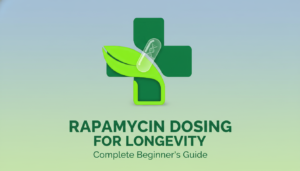Can Rapamycin Delay Menopause? A New Frontier in Women’s Longevity
For generations, menopause has been a biological inevitability—a point of no return in a woman’s life that signals not only the end of fertility but also the start of increased menopause health risks, from heart disease to osteoporosis.
But what if menopause could be delayed—not indefinitely, but long enough to support early menopause prevention, better hormonal balance, and improved long-term health?
That’s the provocative question scientists are now exploring with the help of an unexpected ally: rapamycin, a drug once used primarily in organ transplants but now gaining attention for its potential role in women’s longevity.
Much of this renewed interest comes from expanding research into rapamycin’s impact on aging, as highlighted in studies like Is Rapamycin an Effective Longevity Drug? and Rapamycin and the Future of Healthy Aging.
From Immune Suppressant to Anti-Aging Marvel
Rapamycin first made medical headlines as an immune-suppressing drug used after organ transplants. Over the past decade, however, it has become a central focus in longevity science. Research summarized in Rapamycin and mTOR: Could This Be the Hidden Switch Controlling Aging? shows how rapamycin influences cellular repair and metabolic pathways.
Studies in mice, flies, and even dogs suggest it can extend lifespan and improve healthspan—especially in low-dose, intermittent regimens.
Animal-based evidence, including new data in Can Rapamycin Slow Aging in Dogs?, has paved the way for exploring rapamycin’s benefits in women.
Now researchers are asking a transformative new question:
Could rapamycin slow reproductive aging too?
This includes its potential role in rapamycin for ovarian aging, a concept aligned with broader findings from Rapamycin in 2025: Surprising New Findings on Aging, Immunity and Women’s Health.
The Columbia Study: Delaying the Biological Clock
A pioneering team at Columbia University is exploring this possibility through a clinical trial testing whether low-dose rapamycin menopause therapy can delay ovarian aging in women aged 35 to 45—a period when egg reserves and hormone levels naturally begin to decline.
For context on how low-dose approaches work, see Weekly Rapamycin Shows Promise in Improving Symptoms of ME/CFS, which demonstrates the safety of intermittent dosing.
The study is still in early phases, but so far, results show:
- No serious side effects reported
- Participants tolerating low-dose rapamycin well
- Continuous monitoring of hormone production, mood, sleep, memory, and overall well-being
If successful, this trial could redefine strategies for early menopause prevention and reshape how physicians approach fertility and long-term women’s health — a topic supported by early discussions in Dream Come True? Drug Could Extend Women’s Fertility by Five Years.
Why This Matters: Menopause Isn’t Just About Fertility
The shift to menopause impacts far more than reproductive function. Estrogen plays a critical protective role in the body, influencing:
- Bone density
- Cardiovascular health
- Cognitive function
- Metabolism and fat distribution
A decline in estrogen contributes to chronic conditions such as heart disease, osteoporosis, cognitive decline, and accelerated aging.
Rapamycin’s potential ability to preserve ovarian function and delay this decline aligns with broader findings in longevity research, such as Can Rapamycin Really Help You Live Longer?.
This is why experts believe that delaying menopause—even by 5 to 10 years—could significantly reduce menopause health risks and improve quality of life.
Rethinking Aging for Women
The link between rapamycin and menopause delay is part of a broader movement toward understanding rapamycin female longevity within modern aging science.
For example, What’s Next for Rapamycin? Inside the New Age of Longevity Research explores how rapamycin may influence different aging pathways, including those relevant to women’s biology.
For decades, medical research has underrepresented sex-specific aging patterns. Now, scientists are examining how interventions—such as diet, exercise, supplements, and targeted pharmaceuticals—can be tailored specifically to women’s hormonal biology and aging trajectories.
Rapamycin is one of the key molecules being explored in this new paradigm, especially given insights highlighted in The Youth Pill? Surprising Scientific Discoveries About Rapamycin.
What’s Next?
If future results continue to show that rapamycin can safely delay menopause, preserve ovarian function, and support early menopause prevention, we could soon witness a revolutionary shift in women’s healthcare.
Combination therapies — already shown effective in A New Hope Against Aging: Rapamycin + Trametinib — may further enhance outcomes.
But this emerging field is not about superficial anti-aging.
It’s about:
- Optimizing long-term health
- Reducing menopause-related risks
- Supporting hormonal balance
- Extending vitality and healthspan
Whether rapamycin becomes a standard therapy or not, it is already forcing scientists to rethink what is “normal” in women’s aging—and what might be possible with modern longevity research.
To understand where the field is headed, see Rapamycin: The Future of Longevity




